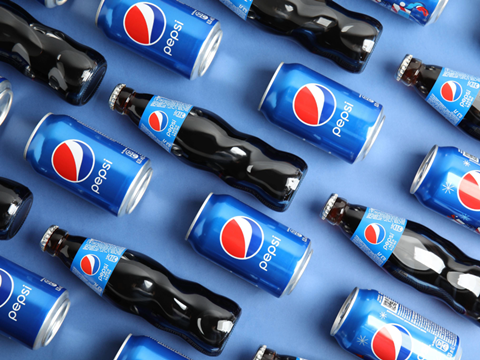
In its 2024 ESG Summary, PepsiCo reports a 15% increase in recycled plastic across its primary packaging in key markets between 2023 and 2024, as well as a 5% reduction in virgin plastic tonnage.
The summary covers all three pillars of PepsiCo’s sustainability strategy, PepsiCo Positive (pep+) – Positive Agriculture, Positive Value Chain, and Positive Choices. This includes its packaging targets, which were revised in May to reflect limitations outside the company’s control.
These are said to include a shortage of ‘well-designed’ Extended Producer Responsibility (EPR) systems across the world, as well as India’s decision to pass a law allowing rPET to be implemented into beverage packaging as recently as 2023.
PepsiCo asserts that its new sustainability goals ‘align with the latest science, focus on where it believes it can have the most positive impact and strengthen its business for the long-term.’ It states its commitment to transparent reporting as it navigates both progress and challenges.
Among these new targets are a minimum threshold of 40% recycled content for its primary plastic packaging by 2035 or sooner, and a 2% average annual reduction in year-over-year absolute tonnage of virgin plastic by 2030.
According to the company, approximately sixty of its markets distributed at least one PepsiCo product in packaging containing rPET.
It also aspires to design at least 97% of its primary and secondary packaging in key markets to be reusable, recyclable, or compostable by 2023. As of 2024, it claims to have reached 93% – attributing the figure to a transition into paper packaging for its Walkers Snack A Jacks multipacks in the UK, its decision to recolour its Mountain Dew bottles from dark to light green in Pakistan, and more.
It plans to phase out hard-to-recycle materials like non-recyclable labels, arguing that ‘significant changes’ are required to improve recycling infrastructure as a whole, especially ensuring that end-of-life packaging stays in the loop and becomes recyclate for future PepsiCo packaging. In the meantime, it states its intent to help improve the recyclability of flexible food packaging and increase consumer access to recycling.
The summary also highlights PepsiCo’s involvement in the Business Coalition for a Global Plastics Treaty, stating that an international agreement ‘could deliver benefits through aligned definitions and metrics, agreement on measures to improve packaging design and improved waste management systems, including smart EPR policies based on industry-aligned principles, among other provisions.’
“No one company or industry can create a circular economy on its own,” the report reads. “Advancing the sustainability and circularity of our packaging requires comprehensive systems solutions, many of which are complex and hinge on significant systemic transformations such as infrastructure, policy, and consumer engagement.
“We are working with our stakeholders, including governments, NGOs, suppliers, customers, peer companies, consumers and more, to find scalable solutions. To achieve these transformations, multi-stakeholder collaboration and action-oriented partnerships across key points along the packaging value chain are needed.”
“Our progress in 2024 shows that when we embed sustainability into the heart of our company, we not only help strengthen our communities and our planet, we also make our business more resilient,” explained Jim Andrew, PepsiCo’s executive vice president and chief sustainability officer.
“At the same time, we know our sustainability journey will not always be linear. There are a number of obstacles that stand in the way of the systemic changes needed to continue making progress at scale.
“To overcome these obstacles, the world needs more collaboration and engagement from business, governments and civil society. We will continue our efforts to lead, to learn from our progress, and to share those learnings to help build a more sustainable and resilient food system.”
“pep+ is not a sustainability strategy,” added chairman and CEO Ramon Laguarta. “It’s an ongoing transformation that powers our whole business, from innovation to production, marketing to distribution.
“When we rolled out pep+ in 2021, we knew it would be important for the long-term strength of our company. Since then, we have worked towards creating value for our shareholders, customers and communities, while aiming to make PepsiCo more resilient and overcome systemic barriers that limit progress.
“I look forward to continuing this critical journey with our associates and partners, as we strive to prove that growth and sustainability go hand in hand.”
Another company to report on its sustainability progress last year is Tetra Pak. It claims to have reduced greenhouse gas emissions across its value chain by 25% since 2019 – a development it partially attributes to packaging solutions with lower carbon footprints.
The Alliance to End Plastic Waste’s progress report for 2024 has also been published. The coalition says that it has reduced 239,985.48 tonnes of unmanaged plastic waste since 2019, with third parties and impact investors said to have contributed US$610.89 million in funding.
In other PepsiCo news, the company recently joined forces with the San Francisco 49ers to introduce reusable cups at Levi’s Stadium. Fans are encouraged to return their cups to designated bins to be collected, sanitized and re-distributed for reuse, a process overseen by Bold Reuse.
If you liked this story, you might also enjoy:
The ultimate guide to the Packaging and Packaging Waste Regulation in 2025
How are the top brands progressing on packaging sustainability?
Everything you need to know about global packaging sustainability regulation in 2025
The key to increasing the use of reusable packaging in supermarkets














No comments yet